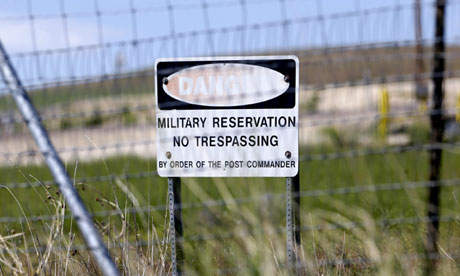Join Date: Feb 2011
Posts: 47,628
Thanks: 27,642
Thanked 14,458 Times in 10,262 Posts
|
 US NET Control >Trump Signs NET Privacy Repeal Into Law=Our Freedom Has Gone Forever
US NET Control >Trump Signs NET Privacy Repeal Into Law=Our Freedom Has Gone Forever
The Chilling Effect of NSA Surveillance on the Open Internet
Snowden's NSA leak revelations are changing people's assumptions about online privacy, killing trust in web freedom
Jeff Jarvis, Guardian UK, Monday 17 June 2013

A military no trespassing sign shown in front of Utah's NSA Data Center. Photograph: Rick Bowmer/AP
I fear the collateral damage the NSA's spying via technology will do to that technology. The essential problem is not the internet or internet companies or even the spies. The real problem is the law and what it does not prevent the American government from doing with technology, and how it does not protect the principles upon which this nation was founded.
The damage to the net and its freedoms will take many forms: users may come to distrust the net for communication, sharing, and storage because they now fear – with cause – that the government will be spying on them, whether or not they are the object of that surveillance. International users – properly concerned that they are afforded even less protection than Americans – may ditch American platforms. The European Union and other national governments, which already were threatening laws targeting US technology companies, will work harder to keep their citizens' data away from the US.
Technologists may find it necessary to build in so many protections, so much encryption and caution, that the openness that is a key value of the net becomes lost.
If we trust the net less, will we use it less? Will it become less of an engine for innovation and economic development? Will it be a diminished tool for speech and assembly among citizens?
If governments use this event as an excuse to exercise more oversight and control over the net, will that not then, in turn, reduce citizens' trust in the net and their freedom using it? Governments present themselves as the protector of our privacy, but as the NSA story demonstrates, governments present the greatest threat to our privacy as they have the means both to surveil us and to use our information against us.
And note well that governments' relationship with the net is necessarily influenced by the net's disruptive force on government: witness the internet's use in organizing protests against governments in Turkey, Brazil, Egypt, Tunisia, Iran, and more nations by the day. Isn't a weakened, controlled, distrusted net in governments' interests?
So far, much of the negative coverage and emotion in this story have centered on the technology companies alleged by Edward Snowden's leaked PowerPoint slides to have cooperated with the NSA. The Washington Post has yet to correct its contention that the NSA and FBI are "tapping directly" into the servers of internet companies, though that simplistic characterization has been soundly denied by Google, Facebook, and others.
The Associated Press has given a more nuanced and sensible interpretation of the slides, explaining that some Prism data is the product of warrants served on those companies, producing data from their servers that is delivered by file transfer, or disc in Google's case, and some is the result of apparent wholesale eavesdropping on internet fibre.
That tapping into the net's full flow of communications is far more troubling even than the US government's secret warrants. For a savvy description of how that can occur, listen to security expert Steve Gibson's podcast. I've yet to hear internet bandwidth providers (Level3, Verizon, et al) questioned as internet service companies have been about whether and how they are cooperating with the spies. That is a next phase of this story.
What the NSA is doing may be legal, made so by the Patriot Act. But even on Fox News, regular contributor Andrew Napolitano has questioned whether its actions and this law are constitutional. That is the key question Edward Snowden and company now put before us: what principles are being violated or upheld by the government's actions? That is the discussion we must have. I see these core principles at stake.
First, Privacy:
In the United States, first-class letters and parcels are protected from search and seizure except by warrant. That should be the case, but is not, for any private communication using any technology: other classes of mail, email, internet telephony, Twitter direct message, or means yet to be invented.
Second, the Balance of Powers:
The NSA is overseen by a secret court and gagged legislators.
Thus, save for Snowden's leaking, we the people are excluded from the information we need and the opportunity we deserve to keep our representatives and agents in check.
A third principle riding atop these is transparency:
The notion that government should be transparent by default and secret by necessity (and there are necessary secrets). Today, government is secret by default and transparent by force, whether from whistleblowers and journalists. When government threatens to torture the whistleblowers and prosecute the journalists who share information with us, then that puts a chill on speech and a choke on the transparency citizens depend upon to assure their rights and monitor their governments.
The first two are principles enshrined in the US constitution: in the fourth amendment that guarantees freedom from unreasonable searches and seizures; and in the structure of American government itself. The third is a principle whose value I have learned from the net and the power it gives any citizen to speak publicly; to find, organize, or join a public; and ultimately, to choose what is public and what is not. The NSA's actions and the laws that enable them – as well as some occasionally overblown conjecture around this – threaten to diminish the power and freedom of the net.
I worry that the damage is done.
.
|